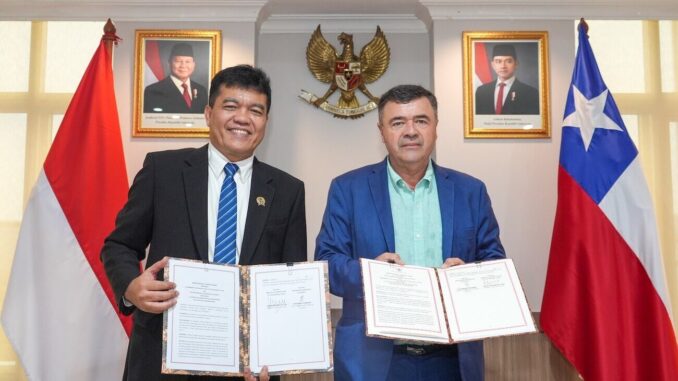
JAKARTA, Indonesia (Santiago Times Reporter) — Chile and Indonesia signed a new agreement Monday aimed at strengthening cooperation on agricultural quarantine measures and electronic certification, reinforcing a growing trade relationship between the two countries.
Chilean Agriculture Minister Esteban Valenzuela and Sahat M. Panggabean, head of Indonesia’s Quarantine Agency, signed a memorandum of understanding (MoU) in Jakarta, marking a new chapter in bilateral agricultural relations.
“Chile sees Indonesia as a strategic trading partner with great potential across various sectors,” Valenzuela said. “This agreement not only reinforces trust between us but also acknowledges our country as a reliable partner with high sanitary standards.”
The MoU focuses on enhancing phytosanitary cooperation — measures related to plant health and pest control — and developing systems for electronic certification of agricultural products. It builds upon a 2021 agreement that launched technical collaboration between the two countries’ agriculture ministries.
Valenzuela said the earlier partnership laid the groundwork for a shared approach to sustainable development and long-term cooperation.
“In a challenging international context, agreements like this become strategic bridges with emerging economies of global relevance, such as Indonesia,” he said. Indonesia is the fourth most populous country in the world and a major player in Southeast Asia.
Panggabean echoed the significance of the agreement, citing its potential to improve access to both markets and to strengthen protections for plant, animal and aquatic health.
“The bilateral relationship between Indonesia and Chile has long been positive,” he said. “We hope this cooperation further strengthens our commercial ties.”
Expanding trade potential
Agriculture is a key sector for Indonesia, contributing roughly 13% to its gross domestic product and employing more than 30% of the active workforce. The country is a top global producer of palm oil, rice, rubber, coffee, cocoa, tea, spices and tropical fruits.
Chile’s exports to Indonesia reached $44.3 million in 2024, while imports from Indonesia totaled $24.8 million, resulting in a trade surplus of $19.5 million for Chile, according to government figures.
Chile currently exports several agricultural products to Indonesia, including blueberries, cherries, kiwifruit, frozen grapes, and walnuts. Since 2023, Halal certification has further opened Indonesian markets to Chilean livestock products.
“We continue to see significant growth potential in this relationship,” Valenzuela said, noting ongoing discussions about expanding access for Chilean lemons and beef.
In 2024, Chile’s top exports to Indonesia included cellulose pulp (32%), sawn timber (23.5%), inulin (22.8%), fresh grapes (10%) and wine with designation of origin (3.1%).
Indonesia’s leading exports to Chile included vegetable oils (40%), other oils (15%), cocoa powder (12%), coconut oil (7.1%), canned pineapple (3.3%) and dehydrated coconut (3.3%).
“We share a common vision of sustainable development and a strong commitment to deepening our agricultural relations,” Valenzuela said. “Today in Jakarta, we are planting a new seed of cooperation — one that will undoubtedly bear fruit in the years to come.”


